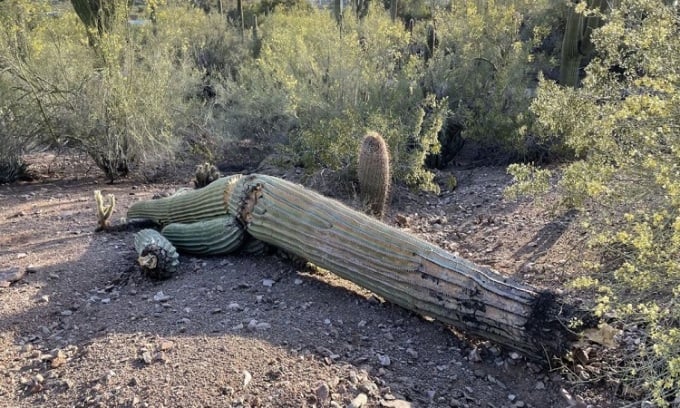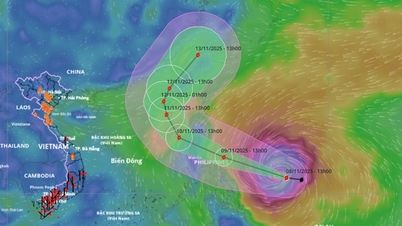Record-high temperatures in Arizona, combined with a lack of monsoons, put the saguaro cacti at the Desert Botanical Garden under great stress.

A cactus collapsed in the botanical garden. Photo: KVOA
Kimberlie McCue, director of science at the botanical garden, said the saguaro cactus was likely "fairly normal" or slightly soft before its sudden collapse, suggesting it was rotting from the inside due to heat-related stress, CNN reported on July 28.
Every February, the Desert Botanical Garden takes an inventory of its saguaro cacti and assesses the condition of each one. McCue says that since 2020, when record temperatures stressed many saguaro cacti, she and her colleagues have seen more and more cacti die at the botanical garden. The current record heat has pushed some previously affected plants to the brink, causing them to drop branches or even collapse. The evening of July 26 ended a record 16-day streak of temperatures above 90 degrees Fahrenheit in Phoenix. The city experienced temperatures above 111 degrees Fahrenheit again on July 27.
Cacti perform many essential functions at night. That’s when they regasify, absorbing carbon dioxide used for photosynthesis during the day. But as Phoenix experiences record-breaking heat at night, the conditions suffocate and stress the saguaro, leading to dehydration and increased vulnerability to disease and insects. McCue says saguaro cacti are well adapted to hot, dry environments, but they do have their limits.
Phoenix is one of nine cities in the US with at least a million people living in neighborhoods with temperatures several degrees warmer than the surrounding area. In Tucson, temperatures still hover above 100 degrees, but the local saguaro doesn’t face the same pressure because it’s less affected by the urban “heat island” effect. The biggest threat to saguaro cacti is that as temperatures rise over time, new generations of cacti will have a harder time growing, says Erik Rakestraw, curator of plants at the Arizona-Sonora Desert Museum.
An Khang (According to CNN )
Source link







![[Photo] Cutting hills to make way for people to travel on route 14E that suffered landslides](https://vphoto.vietnam.vn/thumb/1200x675/vietnam/resource/IMAGE/2025/11/08/1762599969318_ndo_br_thiet-ke-chua-co-ten-2025-11-08t154639923-png.webp)






























![[Photo] "Ship graveyard" on Xuan Dai Bay](https://vphoto.vietnam.vn/thumb/1200x675/vietnam/resource/IMAGE/2025/11/08/1762577162805_ndo_br_tb5-jpg.webp)







![[Video] Hue Monuments reopen to welcome visitors](https://vphoto.vietnam.vn/thumb/402x226/vietnam/resource/IMAGE/2025/11/05/1762301089171_dung01-05-43-09still013-jpg.webp)




































































Comment (0)